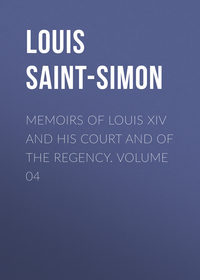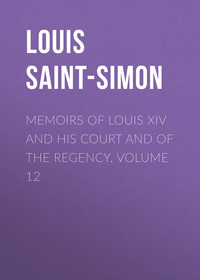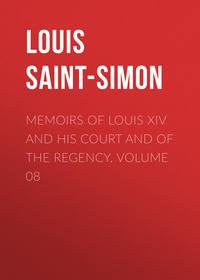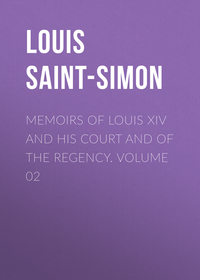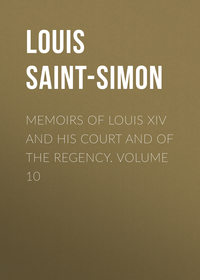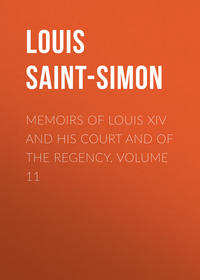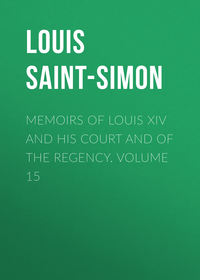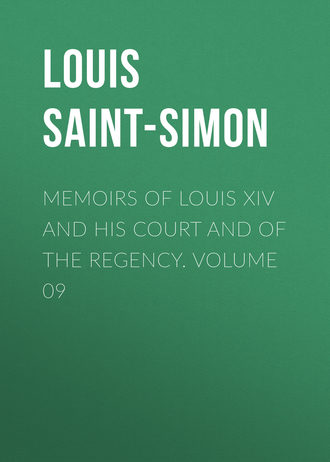 полная версия
полная версияMemoirs of Louis XIV and His Court and of the Regency. Volume 09
Brancas appreciated all the importance of what was told him, but warned by the fate of the Abbe d'Estrees, fearing even for his couriers, he took the precaution of sending word to the King that he had pressing business to acquaint him with, which he could not trust to paper, and that he wished to be allowed to come to Versailles for a fortnight. The reply was the permission asked for, accompanied, however, with an order to communicate en route with the Duc de Berwick, who was about to pass to Barcelona.
Madame des Ursins, who always found means to be informed of everything, immediately knew of Brancas's projected journey, and determined to get the start of him. At once she had sixteen relays of mules provided upon the Bayonne road, and suddenly sent off to France, on Holy Thursday, Cardinal del Giudice, grand inquisitor and minister of state, who had this mean complaisance for her. She thus struck two blows at once; she got rid, at least for a time, of a Cardinal minister who troubled her, and anticipated Brancas, which in our Court was no small point.
Brancas, who felt all the importance of arriving first, followed the Cardinal on Good Friday, and moved so well that he overtook him at Bayonne, at night while he was asleep; Brancas passed straight on, charging the Commandant to amuse and to delay the Cardinal as long as possible on the morrow; gained ground, and arrived at Bordeaux with twenty-eight post-horses that he had carried off with him from various stations, to keep them from the Cardinal. He arrived in Paris in this manner two days before the other, and went straight to Marly where the King was, to explain the business that had led him there. He had a long audience with the King, and received a lodging for the rest of the visit.
The Cardinal del Giudice rested four or five days at Paris, and then came to Marly, where he was introduced to the King. The Cardinal was somewhat embarrassed; he was charged with no business; all his mission was to praise Madame des Ursins, and complain of the Marquis de Brancas. These praises of Madame des Ursins were but vague; she had not sufficient confidence in the Cardinal to admit to him her real position in our Court, and to give him instructions accordingly, so that what he had to say was soon all said; against the Marquis de Brancas he had really no fact to allege, his sole crime that he was too sharp-sighted and not sufficiently devoted to the Princess.
The Cardinal was a courtier, a man of talent, of business, of intrigue, who felt, with annoyance, that for a person of his condition and weight, such a commission as he bore was very empty. He appeared exceedingly agreeable in conversation, of pleasant manners, and was much liked in good society. He was assiduous in his attentions to the King, without importuning him for audiences that were unnecessary; and by all his conduct, he gave reason for believing that he suspected Madame des Ursins' decadence in our Court, and sought to gain esteem and confidence, so as to become by the support of the King, prime minister in Spain; but as we shall soon see, his ultramontane hobbies hindered the accomplishment of his measures. All the success of his journey consisted in hindering Brancas from returning to Spain. This was no great punishment, for Brancas had nothing more to hope for from Madame des Ursins, and was not a man to lose his time for nothing.
Up to this period not a word had been said to the King (Louis XIV.) by the King of Spain upon the subject of his marriage; not a hint had been given that he meant to remarry, much less with a Parma princess. This proceeding, grafted upon the sovereignty claimed by the Princesse des Ursine, and all her conduct with the King of Spain since the death of the Queen, resolved our King to disgrace her without appeal.
A remark upon Madame des Ursins, accompanied by a smile, escaped from the King, generally so complete a master of himself, and appeared enigmatical to such an extent, although striking, that Torcy, to wham it was addressed, understood nothing. In his surprise, he related to Castries what the King had said; Castries told it to Madame la Duchesse d'Orleans, who reported it to M. d'Orleans and to me. We racked our brains to comprehend it, but in vain; nevertheless such an unintelligible remark upon a person like Madame des Ursins, who up to this time had been on such good terms with the King and Madame de Maintenon, did not appear to me to be favourable. I was confirmed in this view by what had just happened with regard to her sovereignty; but I was a thousand leagues from the thunderbolt which this lightning announced, and which only declared itself to us by its fall.
It wits not until the 27th of June that the King was made acquainted by the King of Spain with his approaching marriage. Of course, through other channels, he had not failed to hear of it long before. He passed in the lightest and gentlest manner in the world over this project, and the mystery so long and so complete! with which it had been kept from him, stranger, if possible, than the marriage itself. He could not hinder it; but from this moment he was sure of his vengeance against her who had arranged and brought it about in this manner. The disgrace of Madame des Ursine was in fact determined on between the King and Madame de Maintenon, but in a manner a secret before and since, that I know nobody who has found out by whom or how it was carried out. It is good to admit our ignorance, and not to give fictions and inventions in place of what we are unacquainted with.
I know not why, but a short time after this, the Princesse des Ursine conceived such strong suspicion of the lofty and enterprising spirit of the Princess of Parma that she repented having made this marriage; and wished to break it off. She brought forward; therefore, I know not what difficulties, and despatched a courier to Rome to Cardinal Acquaviva, who did the King of Spain's business there, ordering him to delay his journey to Parma, where he had been commanded to ask the hand of the Princess, and to see her provisionally espoused. But Madame des Ursins had changed her mind too late. The courier did not find Acquaviva at Rome. That Cardinal was already far away on the road to Parma, so that there were no means of retreat.
Acquaviva was received with great honour and much magnificence; he made his demand, but delayed the espousals as long as he could, and this caused much remark. The marriage, which was to have been celebrated on the 25th of August, did not take place until the 15th of September. Immediately after the ceremony the new Queen set out for Spain.
An envoy from Parma, with news of the marriage of the Princess, arrived at Fontainebleau on the 11th October, and had an audience with the King. This was rather late in the day: For dowry she had one hundred thousand pistoles, and three hundred thousand livres' worth of jewels. She had embarked for Alicante at Sestri di Levante. A violent tempest sickened her of the sea. She landed, therefore, at Monaco, in order to traverse by land Provence, Languedoc, and Guienne, so as to reach Bayonne, and see there the Queen Dowager of Spain; sister of her mother, and widow of Charles II. Desgranges, master of the ceremonies, was to meet her in Provence, with orders to follow her, and to command the governors, lieutenants-general, and intendants to follow her also, and serve her, though she travelled incognito.
The new Queen of Spain, on arriving at Pau, found the Queen Dowager, her aunt, had come expressly from Bayonne to meet her. As they approached each other, they both descended at the same time, and after saluting, mounted alone into a beautiful caleche that the Queen Dowager had brought with her, and that she presented to her niece. They supped together alone. The Queen Dowager conducted her to Saint-Jean Pied-de-Port (for in that country, as in Spain, the entrances to mountain passes are called ports). They separated there, the Queen Dowager making the Queen many presents, among others a garniture of diamonds. The Duc de Saint-Aignan joined the Queen of Spain at Pau, and accompanied her by command of the King to Madrid. She sent Grillo, a Genoese noble, whom she has since made grandee of Spain, to thank the King for sending her the Duc de Saint-Aignan, and for the present he brought with him. The officers of her household had been named by Madame des Ursins.
The Queen of Spain advanced towards Madrid with the attendants sent to accompany her. She was to be met by the King of Spain at Guadalaxara, which is about the same distance from Madrid as Paris is from Fontainebleau. He arrived there, accompanied by the attendants that the Princesse des Ursins had placed near him, to keep him company, and to allow no one else to approach him. She followed in her coach, so as to arrive at the same time, and immediately afterwards he shut himself up alone with her, and saw nobody until he went to bed. This was on the 22nd of December. The next day the Princesse des Ursins set out with a small suite for a little place, seven leagues further, called Quadraque, where the Queen was to sleep that night. Madame des Ursins counted upon enjoying all the gratitude that the queen would feel for the unhoped-for grandeur she had obtained by her means; counted upon passing the evening with her, and upon accompanying her next day to Guadalaxara. She found, upon arriving at Quadraque, that the Queen had already reached there. She at once entered into a lodging that had been prepared for her, opposite that of the Queen. She was in a full Court dress. After adjusting it in a hurried manner, she went to the Queen. The coldness and stiffness of her reception surprised her extremely. She attributed it in the first place to the embarrassment of the Queen, and tried to melt this ice. Everybody withdrew, in order to leave the two alone.
Then the conversation commenced. The Queen would not long allow Madame des Ursins to continue it; but burst out into reproaches against her for her manners, and for appearing there in a dress that showed want of respect for the company she was in. Madame des Ursins, whose dress was proper, and who, on account of her respectful manners and her discourse, calculated to win the Queen, believed herself to be far from meriting this treatment, was strangely surprised, and wished to excuse herself; but the Queen immediately began to utter offensive words, to cry out, to call aloud, to demand the officers of the guard, and sharply to; command Madame des Ursins to leave her presence. The latter wished to speak and defend herself against the reproaches she heard; but the Queen, increasing her fury and her menaces, cried out to her people to drive this mad woman from her presence and from the house; and absolutely had her turned out by the shoulders. Immediately afterwards, she called Amenzaga, lieutenant of the body-guard, and at the same time the ecuyer who had the control of her equipages. She ordered the first to arrest Madame des Ursins, and not quit her until he had placed her in a coach, with two sure officers of the guard and fifteen soldiers as sentinels over her; the second she commanded to provide instantly a coach and six, with two or three footmen, and send off in it the Princesse des Ursins towards Burgos and Bayonne, without once stopping on the road. Amenzago tried to represent to the Queen that the King of Spain alone had the power to give such commands; but she haughtily asked him if he had not received an order from the King of Spain to obey her in everything, without reserve and without comment. It was true he had received such an order, though nobody knew a word about it.
Madame des Ursins was then immediately arrested, and put into a coach with one of her waiting-women, without having had time to change her costume or her head-dress, to take any precaution against the cold, to provide herself with any money or other things, and without any kind of refreshment in the coach, or a chemise; nothing, in fact, to change or to sleep in! She was shipped off thus (with two officers of the guard; who were ready as soon as the coach), in full Court dress, just as she left the Queen. In the very short and tumultuous interval which elapsed, she sent a message to the Queen, who flew into a fresh passion upon not being obeyed, and made her set out immediately.
It was then nearly seven o'clock in the evening, two days before Christmas, the ground all covered with snow and ice, and the cold extreme and very sharp and bitter, as it always is in Spain. As soon as the Queen learned that the Princesse des Ursins was out of Quadraque, she wrote to the King of Spain, by an officer of the guards whom she despatched to Guadalaxara. The night was so dark that it was only by means of the snow that anything could be seen.
It is not easy to represent the state of Madame des Ursins in the coach. An excess of astonishment and bewilderment prevailed at first, and suspended all other sentiment; but grief, vexation, rage, and despair, soon followed. In their turn succeeded sad and profound reflections upon a step so violent, so unheard-of, and so unjustifiable as she thought. Then she hoped everything from the friendship of the King of Spain and his confidence in her; pictured his anger and surprise, and those of the group of attached servitors, by whom she had surrounded him, and who would be so interested in exciting the King in her favour. The long winter's night pissed thus; the cold was, terrible, there was nothing to ward it off; the coachman actually lost the use of one hand. The morning advanced; a halt was necessary in order to bait the horses; as for the travellers there is nothing for them ever in the Spanish inns. You are simply told where each thing you want is sold. The meat is ordinarily alive; the wine, thick, flat, and strong; the bread bad; the water is often worthless; as to beds, there are some, but only for the mule- drivers, so that you must carry everything with you, and neither Madame des Ursins nor those with her had anything whatever. Eggs, where they could find any, were their sole resource; and these, fresh or not, simply boiled, supported them during all the journey.
Until this halt for the horses, silence had been profound and uninterrupted; now it was broken. During all this long night the Princesse des Ursins had had leisure to think upon the course she should adopt, and to compose her face. She spoke of her extreme surprise, and of the little that had passed between her and the Queen. In like manner the two officers of the guard accustomed, as was all Spain, to fear and respect her more than their King, replied to her from the bottom of that abyss of astonishment from which they had not yet arisen. The horses being put to, the coach soon started again. Soon, too, the Princesse des Ursins found that the assistance she expected from the King did not arrive. No rest, no provisions, nothing to put on, until Saint-Jean de Luz was reached. As she went further on, as time passed and no news came, she felt she had nothing more to hope for. It may be imagined what rage succeeded in a woman so ambitious, so accustomed to publicly reign, so rapidly and shamefully precipitated from the summit of power by the hand that she herself had chosen as the most solid support of her grandeur. The Queen had not replied to the last two letters Madame des Ursins had written to her. This studied negligence was of bad augury, but who would have imagined treatment so strange and so unheard of?
Her nephews, Lanti and Chalais, who had permission to join her, completed her dejection. Yet she was faithful to herself. Neither tears nor regrets, neither reproaches nor the slightest weakness escaped her; not a complaint even of the excessive cold, of the deprivation of all things, or of the extreme fatigue of such a journey. The two officers who guarded her could not contain their admiration.
At Saint-Jean de Luz, where she arrived on the 14th of January, 1715, she found at last her corporeal ills at an end. She obtained a bed, change of dress, food, and her liberty. The guards, their officers, and the coach which had brought her, returned; she remained with her waiting-maid and her nephews. She had leisure to think what she might expect from Versailles. In spite of her mad sovereignty scheme so long maintained, and her hardihood in arranging the King of Spain's marriage without consulting our King, she flattered herself she should find resources in a Court she had so long governed. It was from Saint-Jean de Luz that she despatched a courier charged with letters for the King, for Madame de Maintenon, and for her friends. She briefly gave us an account in those letters of the thunderbolt which had fallen on her, and asked permission to come to the Court to explain herself more in detail. She waited for the return of her courier in this her first place of liberty and repose, which of itself is very agreeable. But this first courier despatched, she sent off Lanti with letters written less hastily, and with instructions. Lanti saw the King in his cabinet on the last of January, and remained there some moments. From him it was known that as soon as Madame des Ursins despatched her first courier, she had sent her compliments to the Queen Dowager of Spain at Bayonne, who would not receive them. What cruel mortifications attend a fall from a throne! Let us now return to Guadalaxara.
CHAPTER LXV
The officer of the guards, whom the Queen despatched with a letter for the King of Spain as soon as Madame des Ursins was out of Quadraque, found the King upon the point of going to bed. He appeared moved, sent a short reply to the Queen, and gave no orders. The officer returned immediately. What is singular is, that the secret was so well kept that it did not transpire until the next morning at ten o'clock. It may be imagined what emotion seized the whole Court, and what divers movements there were among all at Guadalaxara. However, nobody dared to speak to the King, and much expectation was built upon the reply he had sent to the Queen. The morning passed and nothing was said; the fate of Madame des Ursins then became pretty evident.
Chalais and Lanti made bold to ask the King for permission to go and join the Princess in her isolation. Not only he allowed them to do so, but charged them with a letter of simple civility, in which he told her he was very sorry for what had happened; that he had not been able to oppose the Queen's will; that he should continue to her her pensions, and see that they were punctually paid. He was as good as his word: as long as she lived she regularly received them.
The Queen arrived at Guadalaxara on the afternoon of the day before Christmas day, at the hour fixed, and as though nothing had occurred. The King received her in the same manner on the staircase, gave her his hand, and immediately led her to the chapel, where the marriage was at once celebrated; for in Spain the custom is to marry after dinner. After that he led her to her chamber, and straightway went to bed; it was before six o'clock in the evening, and both got up again for the midnight mass. What passed between them upon the event of the previous evening was entirely unknown, and has always remained so. The day after Christmas day the King and Queen alone together in a coach, and followed by all the Court, took the road for Madrid, where there was no more talk of Madame des Ursins than if the King had never known her. Our King showed not the least surprise at the news brought to him by a courier despatched from Guadalaxara by the Duc de Saint-Aignan, though all the Court was filled with emotion and affright after having seen Madame des Ursins so triumphant.
Let us now look about for some explanations that will enable us to pierce this mystery—that remark to Torcy which escaped the King, which Torcy could not comprehend, and which he related to Castries, who told it to Madame la Duchesse d'Orleans, from whom I learned it! Can we imagine that a Parma princess brought up in a garret by an imperious mother, would have dared to take upon herself, while six leagues from the King of Spain whom she had never seen, a step so bold and unheard-of, when we consider against whom directed, a person possessing the entire confidence of that King and reigning openly? The thing is explained by the order, so unusual and so secret, that Amenzago had from the King of Spain to obey the Queen in everything, without reserve and without comment; an order that became known only at the moment when she gave orders to arrest Madame des Ursins and take her away.
Let us remark, too, the tranquillity with which our King and the King of Spain received the first intelligence of this event; the inactivity of the latter, the coldness of his letters to Madame des Ursins, and his perfect indifference what became of a person who was so cherished the day before, and who yet was forced to travel deprived of everything, by roads full of ice and snow. We must recollect that when the King banished Madame des Ursins before, for opening the letter of the Abbe d'Estrees, and for the note she sent upon it, he did not dare to have his orders executed in the presence of the King of Spain. It was on the frontier of Portugal, where our King wished him to go for the express purpose, that the King of Spain signed the order by which the Princesse des Ursins was forced to withdraw from the country. Now we had a second edition of the same volume. Let me add what I learnt from the Marechal de Brancas, to whom Alberoni related, a long while after this disgrace, that one evening as the Queen was travelling from Parma to Spain, he found her pacing her chamber, with rapid step and in agitation muttering to herself, letting escape the name of the Princesse des Ursins, and then saying with heat, "I will drive her away, the first thing." He cried out to the Queen and sought to represent to her the danger, the madness, the inutility of the enterprise which overwhelmed him: "Keep all this quiet," said the Queen, "and never let what you have heard escape you. Not a word! I know what I am about."
All these things together threw much light upon a catastrophe equally astonishing in itself and in its execution, and clearly show our King to have been the author of it; the King of Spain a consenting party and assisting by the extraordinary order given to Amenzago; and the Queen the actress, charged in some mariner by the two Kings to bring it about. The sequel in France confirmed this opinion.
The fall of the Princesse des Ursins caused great changes in Spain. The Comtesse d'Altamire was named Camarera Mayor, in her place. She was one of the greatest ladies in all Spain, and was hereditary Duchess of Cardonne. Cellamare, nephew of Cardinal del Giudice, was named her grand ecuyer; and the Cardinal himself soon returned to Madrid and to consideration. As a natural consequence, Macanas was disgraced. He and Orry had orders to leave Spain, the latter without seeing the King. He carried with him the maledictions of the public. Pompadour, who had been named Ambassador in Spain only to amuse Madame des Ursins, was dismissed, and the Duc de Saint-Aignan invested with that character, just as he was about to return after having conducted the Queen to Madrid.
In due time the Princesse des Ursins arrived in Paris, and took up her quarters in the house of the Duc de Noirmoutiers, her brother, in the Rue Saint-Dominique, close to mine. This journey must have appeared to her very different from the last she had made in France, when she was Queen of the Court. Few people, except her former friends and those of her formal cabal, came to see her; yet, nevertheless, some curious folks appeared, so that for the first few days there was company enough; but after that, solitude followed when the ill-success of her journey to Versailles became known. M. d'Orleans, reunited now with the King of Spain, felt that it was due to his interest even more than to his vengeance to show in a striking manner, that it was solely owing to the hatred and artifice of Madame des Ursins that he had fallen into such disfavour on account of Spain, and had been in danger of losing his head. Times had changed. Monseigneur was dead, the Meudon cabal annihilated; Madame de Maintenon had turned her back upon Madame des Ursins; thus M. d'Orleans was free to act as he pleased. Incited by Madame la Duchesse d'Orleans, and more still by Madame, he begged the King to prohibit Madame des Ursins from appearing anywhere (Versailles not even excepted) where she might meet Madame la Duchesse de Berry, Madame, Monsieur le Duc, and Madame la Duchesse d'Orleans, who at the same time strictly forbade their households to see her, and asked the persons to whom they were particularly attached to hold no intercourse with her. This made a great stir, openly showed that Madame des Ursins had utterly lost the support of Madame de Maintenon and the King, and much embarrassed her.





